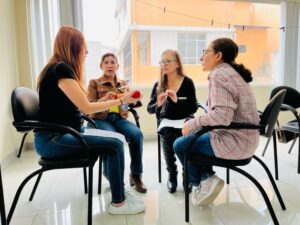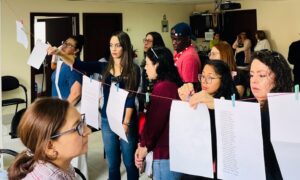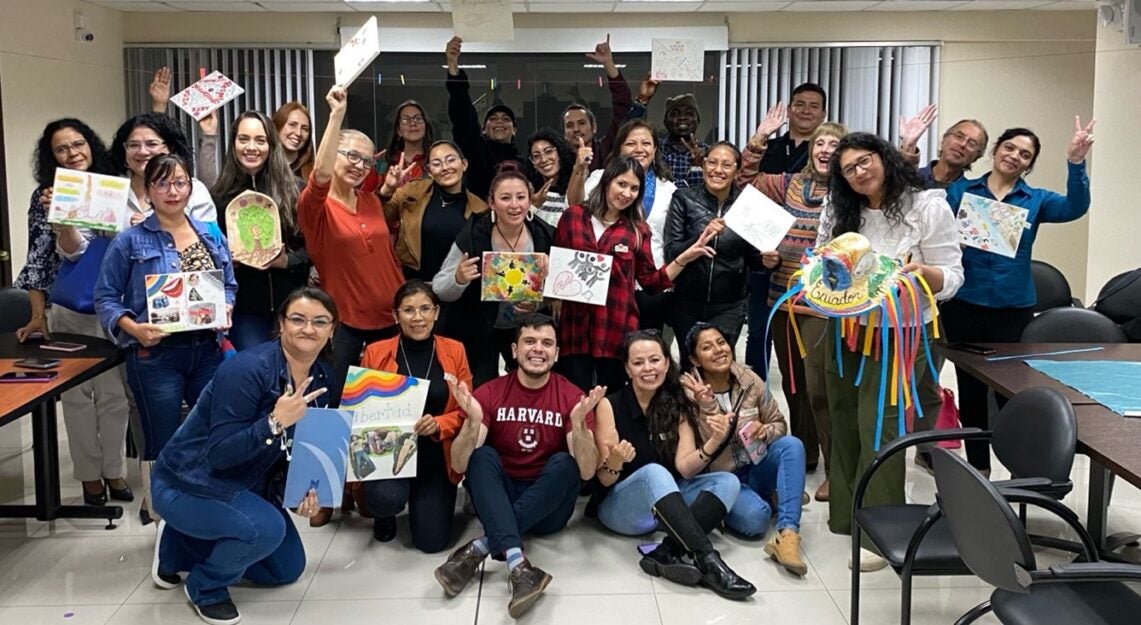Francisco Alvarez, MPH ’24 with Ecuadorean school educators, school directors, and health professionals who participated in the Pre-Text Protocol workshop.
By Francisco Alvarez
Rose Service Learning Fellow
MPH Candidate, Health Management
I spent my last seven years working at one of the largest pharmaceutical companies in the world. I graduated as an economist and have always been passionate about making innovative, groundbreaking, and essential therapies accessible to everyone. Personal family stories on cancer and cancer caregivers inspired me to think about the possibility of healing through art. With this concept in mind, amidst the sea of numbers of my daily job and a passion for art, I began creating paintings and gradually discovered the power of art expression. I started ideating about an organization rooted in community networks that allow people to thrive, learn, and heal through the arts. At Harvard, the idea of making a social impact through art became a reality and underwent a metamorphosis that made it capable of serving a broader population. Thanks to the generous support from the Rose Service Learning Fellowship, I am embarking on a journey to advance mental health awareness, improve literacy rates, and promote art expression as a source of learning and healing.
Watch a workshop in action
After being trained by Professor Doris Sommer on the innovative protocol “Pre-Text”, I became a qualified facilitator on this pedagogical method which aims to transform challenging texts into thought-provoking questions and art. With the widening educational and health inequities, the increasing violence rates in Ecuador, and the emotional and educational toll on children, I decided to act. With my public health knowledge, economics background, and the powerful Pre-Text tool, I partnered with the Ecuadorean organization Neuro Diseño Humano (NDH) to promote mental health awareness among teachers and healthcare professionals to safeguard children and youth.

Ecuador’s overwhelming level of violence and spread of fear over the last months was a call for urgent groundwork intervention to curb the negative exposure to these events. For this intervention, more than 30 teachers and health professionals gathered to co-create and learn from each other, and engage in conversations about mental health prevention in schools, focusing on overcoming the challenging moments facing Ecuadorian children and families. By borrowing from preceding social movements in Latin America, thanks to Pre-Text’s extended impact, teachers were receiving a “vaccine against violence”, mental health stigma, emotional suppression, and mental health illiteracy. By “training the trainers” through an art-based literacy intervention, my mission in Ecuador was to sow the seeds for raising mental health awareness in schools to support children and youth to thrive.
Sessions started with ice-breaking activities to get to know each other, relax, and build community and admiration. Through this activity, we increase self-awareness, allowing individuals to be more confident, creative, and conscious citizens. The beauty of Pre-Text is that it enables learners to “ask questions to the text”, encourage thoughtful reflections, and foster civic and cultural agency. An important lesson from this intervention is that questioning the text, and not persons, supported teachers in reducing the stigma surrounding mental health issues and set the grounds for discussing concerns openly.

As a facilitator, I realized that when participants gathered in a circle and listened to each other, it unblocked the value of real connections, active listening, and citizenship. Open and honest interventions resulted from community-based support with thoughtful reflections on mental health, with the urgency of responsiveness to step up against violence, bullying, microaggressions, harassment, and many other forms that physical and emotional violence can take. The session was closely followed by Neuro Diseño Humano professionals who assist people with emotional support as needed, as seeking support and help for mental health must be normalized in Ecuadorian society.
With the text in hand and the previous reflections, we all engaged in a community art-based creation based on the text. With this creative process, I affirmed the power of the arts, which have therapeutic capabilities and can foster preventative care. Arts become a fascinating tool to learn through expression, release emotions, empower yourself, connect with others, rethink dogmas, and develop a strong sense of community. This experience taught me more than I could teach, getting first-hand insights about mental health challenges in school settings, not only on students but also on teachers’ resiliency to face unexpected situations.
After this fellowship, my mission won’t stop there, as I seek to expand the impact of this project to advance mental health promotion and awareness. As I look to the future, I am turning this project into an organization, Asiri Health, to support mental health literacy through the power of the arts. Here at Harvard, I found myself surrounded by incredible people who will support your ideas and join the efforts to support communities to thrive and grow.

You must be logged in to post a comment.